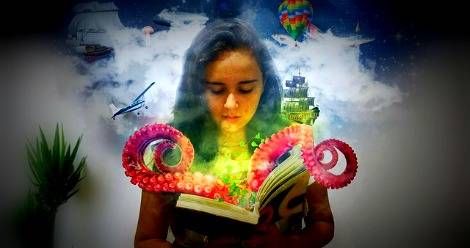
Do You Read In Your Dreams?
Most people dream. In dreams, anything can happen, from flying to sex to showing up for school naked. But there’s one thing that scientists say never happens in dreams: reading.
Think about the last time you read in your dreams, whether it was a street sign or a newspaper or a book. Did you actually see letters? Was it a blank sheet of paper, or an incomprehensible jumble? Chances are it was.
When we dream, the part of the brain responsible for logic and intellect shuts down, allowing us to accept crazy dream stuff as reality while at the same time inhibiting our ability to interpret letters and numbers. Indeed, trying to read something and not being able to is considered one of the surefire signs that you’re dreaming (a few others are not being able to read clocks–one of the reasons why you find so many clocks in surrealist paintings–distortion in everyday patterns like brickwork or wallpaper, and not being able to see yourself in a mirror–you either won’t look like yourself or your face will be blurry).
That said, there may be ways to get around this and actually read in dreams! The secret is lucid dreaming, which is basically where you’re aware that you’re dreaming. Lucid dreams tend to be incredibly vivid and allow you to control things in the dream or use them to solve real-life problems. While the logic part of the brain isn’t as active during lucid dreaming as it is while we’re awake, it is activated, which means letters and numbers can be understood.
In a recent episode of Mr. Robot, Elliot mentioned a friend who would induce lucid dreaming so he could study while he slept. Elliot induced his own lucid dream by chanting, “Body asleep, mind awake,” but in reality it’s not that easy. You can buy fancy gadgets like the iBand, a headband that reads your eye movements to tell when you’re in REM sleep, then flashes lights and plays music. The lights and music should, theoretically, enter your dreams and help you realize you’re dreaming. But the much simpler way is simply to practice.
The best way to prep yourself for lucid dreaming, at least according to some scientists, is to start testing yourself for signs of dreaming while you’re awake. Are you dreaming right now? No, you can’t be, because you’re reading this (but maybe look away from the screen and look back just to make sure the words didn’t shift). Develop a series of tests that become habitual, like reading, looking at the palms of your hands (if they’re lined, you’re awake; if they’re smooth or disfigured, you’re dreaming) and seeing who’s around you. If you’re with strangers, you may be dreaming; if you’re with people you know are dead, you’re DEFINITELY dreaming.
Once you know you’re dreaming, you can bend “reality” to your will and, ironically, you should be able to dream-read if you want to (no guarantee that what you’re reading will make sense though–it probably won’t). Reading a real-life book would still be impossible, UNLESS you had it memorized or you had an audiobook playing in the background (that iBand gadget suddenly got a lot more useful). Even then, the text might not “behave” as a real book would. Confusing?
Not really. Simply put, you can’t read real-life books in dreams because your eyes are closed. If you are reading in a dream, the text is a projection of your subconscious. It may make sense, at least in the dream, but it doesn’t reflect reality.
By that logic, Elliot’s friend’s theory of using lucid dreaming to study wouldn’t work if he hadn’t started studying yet, because you can’t learn new information while sleeping. However, if he had already studied, he COULD use lucid dreaming to reinforce his waking memories and recall the information better upon waking (just FYI, absorbing new information from unread books while sleeping is called osmosis and is more of a psychic skill than a neurological one–although in either case very useful!).
How about you? Have you ever read in a dream, or used lucid dreaming to study? Is this a dream? I think I need to go check my reflection…
















